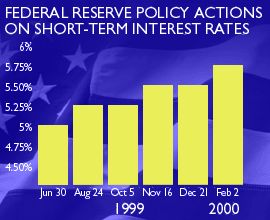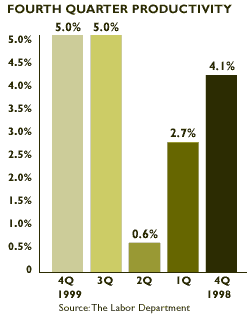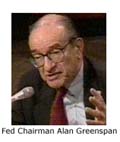|
Greenspan warns again
|
 |
February 23, 2000: 4:33 p.m. ET
Higher rates may be needed to cool the economy, not the stock market
By Staff Writer M. Corey Goldman
|
NEW YORK (CNNfn) - More interest rate increases may be needed to ensure the U.S. economy continues to expand without igniting faster inflation, but they aren't specifically intended to deflate the zealous stock market, Federal Reserve Chairman Alan Greenspan said Wednesday.
Last week, Greenspan put Wall Street on red alert after suggesting in the first leg of his semi-annual testimony to Congress that the Fed would raise rates again to slow the economy down. The Fed last lifted short-term rates in early February, raising its benchmark Fed funds rate by a quarter point in an effort to deter consumers and businesses from borrowing too much.
He repeated those prepared remarks verbatim to the Senate Banking Committee in the second half of his two-part testimony today, adding during the question-and-answer session with senators that the Fed's inflation-fighting gun isn't aimed specifically at Wall Street.
"We don't look at stock prices and say, 'If they are rising we have to raise interest rates,'" Greenspan said during a question-and-answer session following three hours of testimony to the Senate Banking Committee. "To the extent that the stock market affects the economy, we will respond to that."
A mixed reception
"This is the first time Greenspan has come out and said he is not necessarily looking at the stock market," Ash Rajan, a market analyst with Prudential Securities, told CNNfn's Street Sweep. "Greenspan also talked about technology and productivity, which obviously spurred gains in the Nasdaq."
Indeed, the tech-laden Nasdaq index posted its biggest one-day point gain, surging more than 168 points once Greenspan's session concluded around 1 p.m. ET. The more traditional Dow Jones industrial average fell more than 100 points before recovering part of its losses, while the benchmark 30-year Treasury bond fell more than half a point in price.
One boon for investors was Greenspan's remarks about the so-called wealth effect -- where dramatic gains in the stock and real estate markets have given American households more in paper assets. Greenspan suggested to Senators that while the wealth effect is something the Fed is watching closely, it is not necessarily judging it as being "overdone."
 "The wealth effect is not that closely tied to the stock market," he told senators. "We can't argue that there is a direct relationship between what is happening in the stock market and what is happening to monetary policy. That is not our interests." "The wealth effect is not that closely tied to the stock market," he told senators. "We can't argue that there is a direct relationship between what is happening in the stock market and what is happening to monetary policy. That is not our interests."
Another was his discussion about the effect of technology on the economy -- where everything from faster and better computer chips to automated assembly lines to the ever-expanding use of the Internet -- has allowed people to work more efficiently and provided companies with the ability to reducing costs and keep prices low.
That, in turn, has led to higher productivity, which has allowed the economy to grow at a 4-percent-plus annual pace without triggering inflation. Productivity jumped 5 percent in the fourth quarter, according to the Labor Department, while labor costs -- a measure of what companies spend on worker output -- fell 1 percent.
Keep it growing
The Fed's objective, Greenspan said, is to keep the economy growing without inflation indefinitely. At the same time, an inadequate pool of labor and uncertainty about whether productivity gains can continue have spurred the Fed to err on the side of caution when it comes to monetary policy.
"The type of economy that we are dealing with at this particular stage is, I suspect, one that none of us has seen before, and indeed it may be unprecedented in our history," Greenspan said. "Our basic purpose is to keep that process going."
 One of the most obvious effects of the New Paradigm economy has been its remarkable track record at creating American jobs. The U.S. jobless rate currently rests at 4 percent -- a level not seen in 30 years. And employers continue to clamor for workers to fill a growing number of jobs -- particularly in the technology and service sectors. One of the most obvious effects of the New Paradigm economy has been its remarkable track record at creating American jobs. The U.S. jobless rate currently rests at 4 percent -- a level not seen in 30 years. And employers continue to clamor for workers to fill a growing number of jobs -- particularly in the technology and service sectors.
Greenspan cautioned senators, however, that the tight labor market could eventually lead to a pickup in inflation pressures as workers demand higher compensation from their employers, and companies pass on those higher costs by boosting prices for goods and services.
"The fact of the matter is, we do not have an unlimited amount of labor," Greenspan said. Unless the U.S. government relaxes its immigration standards to permit more potential labor into the country, There is no evidence right now of inflation, "the wealth effect cannot persist indefinitely."
Some major concerns
One factor that the Fed is keeping a close eye on is the recent jump in world oil prices, which could trigger faster inflation and undermine the economic expansion, Greenspan said. "It's still a large enough and pervasive enough force within our economy that should we get one of these very severe spikes it would have a major, negative impact on economic growth," he said.
 Greenspan also addressed the issue of margin requirements, where individual and institutional investors can borrow up to 50 percent of the value of their holdings to purchase additional securities. Some lawmakers have argued recently that the level of margin extended to investors be reigned in to prevent individuals from getting hurt if stock values decline dramatically. Greenspan also addressed the issue of margin requirements, where individual and institutional investors can borrow up to 50 percent of the value of their holdings to purchase additional securities. Some lawmakers have argued recently that the level of margin extended to investors be reigned in to prevent individuals from getting hurt if stock values decline dramatically.
But Greenspan reiterated his and the Fed's opposition to raising margin requirements as a tool to deflate stock prices. Under the current Fed rules, last changed in 1974, an investor must put up 50 percent of the assets with a broker to take a position in a stock on margin. While margin requirements may affect borrowing, they do not affect share prices, Greenspan said. (456KB WAV) (456KB AIFF)
If it ain't broke...
Greenspan's testimony to both the Senate and House banking committees are required under the Humphrey-Hawkins Full Employment and Balanced Growth Act, and are closely watched by investors for clues about future Fed policy actions.
To be sure, some senators, including Banking Committee Chairman Phil Gramm (R-Texas), questioned whether Greenspan was tapping on the brakes too hard by raising rates at a time when the economy is enjoying a record economic expansion with virtually no sign of significant inflation.
"Mr. Chairman, please don't try to fix an economy that isn't broken," Gramm said. "Don't become so frightened by success that you throw wet blankets on a fire that isn't burning." 
|
|
|
|
|
|
Federal Reserve
|
Note: Pages will open in a new browser window
External sites are not endorsed by CNNmoney
|
|
|
|
 |

|

